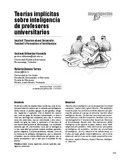Mostrar el registro sencillo del ítem
Teorías implícitas sobre inteligencia de profesores universitarios.
| dc.rights.license | http://creativecommons.org/licenses/by-nc-sa/3.0/ve/ | |
| dc.contributor.author | Villamizar Acevedo, Gustavo | |
| dc.date.accessioned | 2014-06-03T17:47:14Z | |
| dc.date.available | 2014-06-03T17:47:14Z | |
| dc.date.issued | 2014-01 | |
| dc.identifier.issn | 1316-4910 | |
| dc.identifier.uri | http://www.saber.ula.ve/handle/123456789/38586 | |
| dc.description.abstract | Desde hace años los hombres han creado una serie de teorías para tratar de explicar qué se entiende por inteligencia, dichas teorías se pueden agrupar en dos grandes categorías: implícitas y explícitas. Con el objetivo de conocer qué creen un grupo de docentes universitarios, se llevó a cabo una investigación cualitativa, para ello se estructuraron dos entrevistas, una no estructurada y otra estructurada con guía, las cuales se aplicaron a 22 docentes de una universidad privada de Bucaramanga. Los resultados muestran que los entrevistados creen que la inteligencia es una capacidad que permite razonar, analizar, aprender, pensar, adaptarse y resolver problemas. Además creen en la existencia de múltiples inteligencias, que es inherente al hombre, que no existen diferencias por género, que se puede incrementar y que es más que el resultado de una prueba. | es_VE |
| dc.language.iso | es | es_VE |
| dc.rights | info:eu-repo/semantics/openAccess | |
| dc.subject | Teorías implícitas | es_VE |
| dc.subject | Teorías explícitas | es_VE |
| dc.subject | Inteligencia | es_VE |
| dc.subject | Entrevista | es_VE |
| dc.title | Teorías implícitas sobre inteligencia de profesores universitarios. | es_VE |
| dc.title.alternative | Implicit theories about university teacher’s perception of intelligence. | es_VE |
| dc.type | info:eu-repo/semantics/article | |
| dc.description.abstract1 | Theories about intelligence can be grouped into two broad categories: implicit and explicit theories. This qualitative research study was carried out with the objective of exploring the opinion of a group of university teachers about intelligence theories. To that end, structured and unstructured interviews with their respective checklists were created and applied to 22 teachers from the private University of Bucaramanga. Results show that interviewees define intelligence as the capacity to argue, analyze, learn, think, adapt and solve problems. Other interviewees’ perceptions of intelligence are as follows: (a) there are several kinds of intelligence; (b) it is inherent to the human being; (c) it does not imply gender-related differences; (d) it can be enhanced; and (e) it can not be simply measured by a test. | es_VE |
| dc.description.colacion | 103-110 | es_VE |
| dc.description.email | gusvillamizar@yahoo.com | es_VE |
| dc.description.frecuencia | Cuatrimestral | |
| dc.identifier.depositolegal | pp199702ME1027 | |
| dc.publisher.pais | Venezuela | es_VE |
| dc.subject.facultad | Facultad de Humanidades y Educación | es_VE |
| dc.subject.institucion | Universidad de Los Andes | es_VE |
| dc.subject.keywords | Implicit theories | es_VE |
| dc.subject.keywords | Explicit theories | es_VE |
| dc.subject.keywords | Intelligence | es_VE |
| dc.subject.keywords | Interview | es_VE |
| dc.subject.publicacionelectronica | Revista Educere | |
| dc.subject.seccion | Revista Educere: Investigación Arbitrada | es_VE |
| dc.subject.thematiccategory | Artes y Humanidades | es_VE |
| dc.subject.tipo | Revistas | es_VE |
| dc.type.media | Texto | es_VE |
Ficheros en el ítem
Este ítem aparece en la(s) siguiente(s) colección(ones)
-
Educere - Año 018 - Número 059
enero - abril 2014


